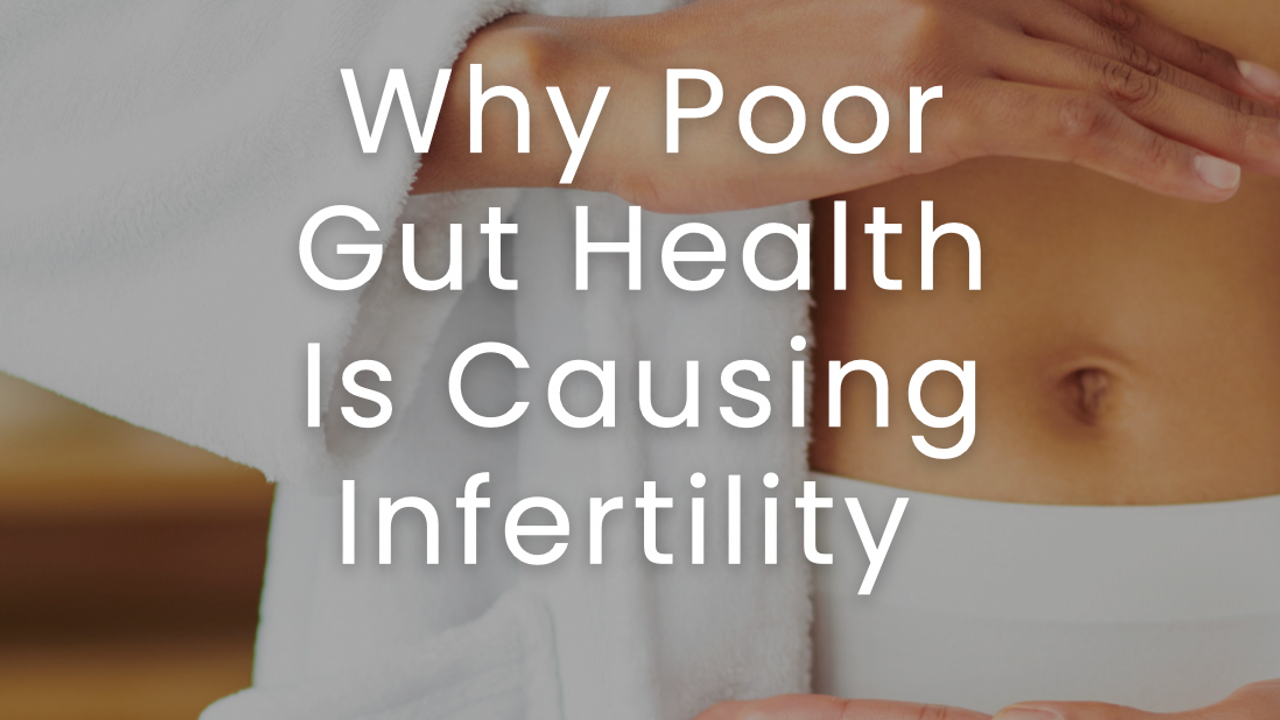Why Poor Gut Health Is Causing Infertility
Jun 20, 2022
Did you know it’s World Infertility Awareness month? Not many people know, but Chris and I struggled to have babies. It took years to finally fall pregnant (after medical intervention), after which we had a miscarriage. I wish I had known back then what I know now about gut health and natural medicine and infertility. It would’ve saved a lot of heartache, pain, and time.
I’m on a mission to end body burnout in high-achieving parents (& parents to be!) - and infertility is a major sign that your body systems have burned out. I don’t want any other parent to suffer the way we did. So I’ve put together some key points when it comes to gut health, infertility, and improving your baby-making outcomes with functional medicine. I actually discussed most of these points last year with Dr. Ashwini on her Holistic GP Podcast, as part of 2021 World Infertility Awareness month. You can listen back to that episode here.
From a functional medicine perspective, what are the main infertility issues?
Functional medicine is all about getting to the root cause of your health issues and also looking at the body as an interconnected system. When it comes to looking at women with infertility issues, I would of course be thinking about body system imbalances with the female hormones, but I’d also be looking at what other body systems may be impacting female hormones, and therefore affecting fertility - things like adrenal stress hormone health, gut health, and also detoxification health.
I’d also be thinking about how the body interacts with the mind, the lifestyle, the environment, and even relationships. Because the way that we think, the way that we feel, the way that we live, the environment that we live in, and the health of our relationship with others can all positively - or negatively - affect the health of the body systems and the female hormones.
Can poor gut health cause infertility?
Yes, definitely! There are many reasons why gut health can affect fertility. Here are the three main reasons.
- Inflammation can stress the adrenal glands, which can then cause female hormones to go out of whack. Why? Because cortisol & DHEA interact with progesterone, oestrogen, and testosterone. Inflammation, in regards to gut health, could be coming from eating inflammatory foods, pathogenic microbes (like candida, parasites, pathogenic bacteria), or even a leaky gut.
- Another reason relates to what is called Faecal B-Glucuronidase. This is a marker that can be assessed on a comprehensive stool test, and it relates to a type of bacterial overgrowth that clings onto oestrogen (and toxins) so that you can’t eliminate excess hormones & toxins via the bowels. So oestrogen gets reabsorbed back into the system, which can then lead to excess oestrogen, which can cause fertility problems.
- Inflammatory foods will stress the gut, and lead to pathogenic overgrowth. Also, it can lead to nutritional deficiencies if you’re not eating a healthy, varied diet (or if you’re not actually absorbing nutrients from your foods because of gut absorption issues), you might not be getting enough nutrients from your food to support healthy female hormones - nutrients like omega 3 and 6 fatty acids, vitamins A, E & D, and foods rich in folic acid (like kale and a lot of your leafy greens).
Can IBS cause fertility problems?
I believe it could. 70% of IBS cases are actually caused by what is called SIBO, or small intestinal bacterial overgrowth. This bacteria that overgrows can produce an endotoxin called lipopolysaccharides (LPS). This endotoxin substance is very inflammatory, it is literally a toxin. A person with a healthy microbiome will still have these endotoxins, but you should be able to regularly excrete them, and it doesn’t cause any harm. If you have SIBO or bacterial overgrowth in the large intestine (which can also cause IBS), your body gets too full of endotoxins, and that’s where it can cause a lot of inflammation, which can stress out your body, and your female hormones.
It’s a bit of a segway, but there is a research article that showed that women with endometriosis had high amounts of lipopolysaccharides - or endotoxins - in their blood when they menstruated, which suggests a link between bacterial overgrowth and female reproduction issues.
Can a leaky gut cause a miscarriage?
This is not something I have necessarily seen in the clinic, among my own clients who have experienced miscarriages. But it’s still something I screen for, and if leaky gut is present, we’ll work on strengthening the gut lining wall. However, there’s an interesting research article that has linked a leaky gut with recurring miscarriages.
A leaky gut is where the gut lining starts to separate, which can then allow food, pathogens, and toxins to enter the bloodstream - when they shouldn’t. And because these foreign particles enter the bloodstream, the body’s immune system actually starts attacking the foreign particles. This is a really stressful and inflammatory condition for the body to be in.
The research article showed that a leaky gut can produce immune triggers, which can negatively affect the endometrial environment - or the woman’s womb - which can lead to a miscarrying.
This condition may also increase women’s natural killer cells as the immune system goes into hyper-drive, which can actually cause a woman to abort a baby when it’s starting to grow.
Poor gut health can cause oestrogen levels to increase. How does oestrogen excess cause infertility?
Excess oestrogen can be a major factor in infertility. A normal healthy cycling woman should produce a higher amount of oestrogen mid-cycle, around day 14. This allows the woman to ovulate and release an egg. The estrogen then drops, which allows progesterone (your other sex hormone) to be produced at higher levels over the second half of the cycle. If the egg is fertilized, progesterone levels will continue rising, which allows the embryo to hold.
Now, when estrogen levels are too high, it can actually suppress the sex hormone progesterone. In this scenario, some women may struggle to produce enough progesterone after an egg is fertilised - if this happens, the egg won’t hold.
I do 28-day female hormone cycle tests with clients trying to fall pregnant, and often we see chronically high oestrogen throughout the whole cycle. This is going to cause issues too, as women may not ever have a spike in oestrogen, which triggers ovulation.
Conversely, do low oestrogen levels mean infertility?
Yes, absolutely, for a similar reason. If oestrogen levels are too low, and you’re just not producing enough, you may fail to actually ovulate mid-cycle, which will mean you never actually release an egg. In this case, some women may not even get a period - which will make it very hard to fall pregnant!
Oestrogen levels also rise during pregnancy, which is part of a healthy pregnancy. So if this doesn’t happen, a woman may be more prone to having miscarriages.
How do you detox from too much oestrogen?
First off, I would make sure the gut is functioning well. Because as I said before if there is an overgrowth of bacteria that clings onto excess oestrogen and doesn’t allow your body to excrete it, you first need to address this. So this may involve doing some antimicrobial treatment, and/or using specific prebiotics to restore a healthy microbiome. PHGG has been shown to help this
Once this is addressed, your body is ready to detox from oestrogen more effectively. I specialise in functional medicine, so I would run a lab test to assess what detox pathways need support, and use specific nutrients to help this - I love antioxidant nutrients (Vit C, AED, CoQ10, Vit B’s) for phase 1 detox, and amino acids such as NAC, glutathione, and Glycine for phase 2 liver detox. And then you want to add in a binder to help pull out oestrogen once it gets dumped back into the gut - calcium d-glucurate is very good for this.
How does one boost their fertility hormones?
First I would make sure that the stress hormones, the gut & detox pathways are all balanced and functioning well. Because if you try and just treat or boost sex hormones when these other areas are out of whack, it can be really difficult.
When it comes to boosting sex hormones like progesterone & estrogen, there are some specific nutritionals that I would be considering, like Vit B6, selenium, zinc, iodine, Omega 3;s, Vit E, and folic acid. I would usually do some sort of combo supplement for these - and maybe additional specific nutrients in higher doses, as indicated by lab test results.
From a lifestyle point of view, it’s imperative to reduce stress, increase anti-inflammatory foods, remove chemicals from your home and workplace, and work on establishing loving relationships (including, and most importantly, with yourself).
If you’re struggling with infertility, I would highly recommend testing not guessing. This is what we do in our ANSWERS phase of the Ending Body Burnout Method. We get a clear understanding of your health ah history, we test body systems that medical doctors do not, that greatly impact fertility, and then we treat the root causes. If you would like us to help you bring your next beautiful baby into the world, we would be honoured to support you. The first step is to book in for a “Connect The Dots” Initial Consult.
Filipa Bellette is Co-Founder of Chris & Filly Functional Medicine. She is an accredited Clinical Nutritionist & Functional Medicine Practitioner. She is also a Ph.D. thought-leader, award-winning writer, and regularly published as a guest blogger & in the media. Together with her husband Chris Bellette, Filipa has worked with over 2,000+ busy, burnout clients in the last 10+ years, and specialises in producing healthy, balanced, and happy Mums & Dads...or as she calls it, a Power Parent! Filipa’s own passion for producing high-performance Power Parents came from her own personal experience of Mummy Burnout, after having babies and juggling the demands of business, family, and her failing health.
Stay connected with news and updates!
Join our mailing list to receive the latest news and updates from our team.
Don't worry, your information will not be shared.
We hate SPAM. We will never sell your information, for any reason.



